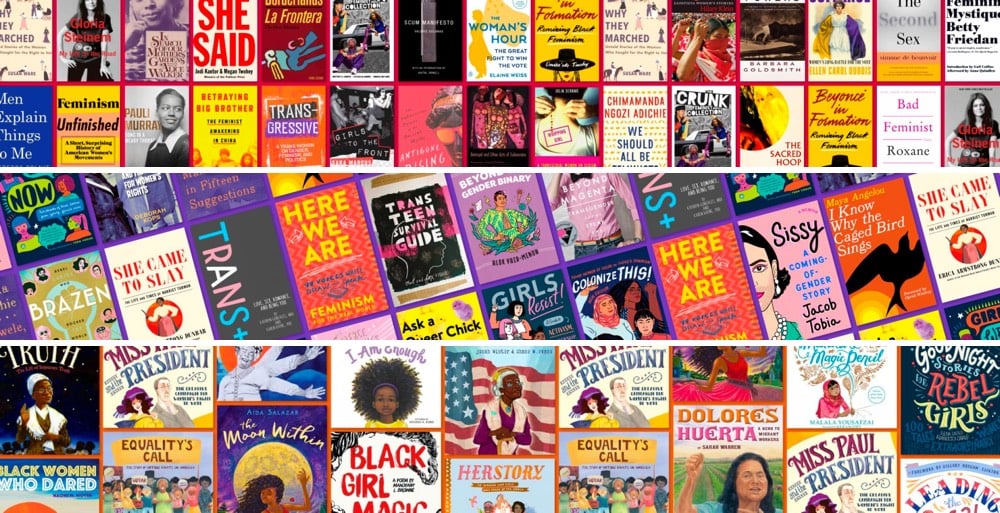The NYPL’s Essential Reads on Feminism

To mark the 100th anniversary of the ratification of the 19th Amendment to the Constitution that made some women eligible to vote in the United States, the New York Public Library is sharing its picks for Essential Reads on Feminism.
The list includes first-hand accounts and histories of the suffrage movement that chronicle both its successes and its limitations — particularly for women of color — as well as contemporary essays on how feminism intersects with race, class, education, and LGBTQ+ activism. From personal memoirs to historical overviews, featuring writing by seminal figures and lesser-known pioneers, the list traces the development of the feminist ideas that have powered the campaign for gender equality, in all its complexity and boldness. While far from complete, the list nevertheless provides a starting point for learning about the history of feminism and for exploring the issues and challenges that many women face today.
They’ve split the list into three main sections according to reader age: kids, teens, and adults. I’m going to highlight a few of the selections from each list here.
For kids:
Black Girl Magic by Mahogany L. Browne. “Black Girl Magic is a journey from girlhood to womanhood and an invitation to readers to find magic in themselves.”
Good Night Stories for Rebel Girls: 100 Tales of Extraordinary Women by Elena Favilli & Francesca Cavallo. My daughter tells me about the women she’s read about in this book all the time.
I Am Enough by Grace Byers. “We are all here for a purpose. We are more than enough. We just need to believe it.”
Malala’s Magic Pencil by Malala Yousafzai. “Nobel Peace Prize winner and New York Times bestselling author Malala Yousafzai’s first picture book, inspired by her own childhood.”
Shaking Things Up: 14 Young Women Who Changed the World by Susan Hood. “Fresh, accessible, and inspiring, Shaking Things Up introduces fourteen revolutionary young women — each paired with a noteworthy female artist — to the next generation of activists, trail-blazers, and rabble-rousers.”
For teens:
I Know Why the Caged Bird Sings by Maya Angelou. “Here is a book as joyous and painful, as mysterious and memorable, as childhood itself.”
Amazons, Abolitionists, and Activists: A Graphic History of Women’s Fight for Their Rights by Mikki Kendall. “Amazons, Abolitionists, and Activists is an indispensable resource for people of all genders interested in the fight for a more liberated future.”
Dear Ijeawele, or a Feminist Manifesto In Fifteen Suggestions by Chimamanda Ngozi Adichie. “Filled with compassionate guidance and advice, it gets right to the heart of sexual politics in the twenty-first century, and starts a new and urgently needed conversation about what it really means to be a woman today.”
Modern Herstory: Stories of Women and Nonbinary People Rewriting History by Blair Imani. “An inspiring and radical celebration of 70 women, girls, and gender nonbinary people who have changed — and are still changing — the world, from the Civil Rights Movement and Stonewall riots through Black Lives Matter and beyond.”
Rethinking Normal: A Memoir in Transition by Katie Rain Hill. “Rethinking Normal is a coming-of-age story about transcending physical appearances and redefining the parameters of ‘normalcy’ to embody one’s true self.”
For adults:
Bad Feminist by Roxane Gay. “A collection of essays spanning politics, criticism, and feminism from one of the most-watched young cultural observers of her generation, Roxane Gay.”
Beyoncé in Formation: Remixing Black Feminism by Omise’eke Tinsley. “In Beyoncé in Formation, Tinsley now takes her rich observations beyond the classroom, using the blockbuster album and video Lemonade as a soundtrack for vital new-millennium narratives.”
A Black Women’s History of the United States by Daina Ramey Berry & Kali Nicole Gross. “A vibrant and empowering history that emphasizes the perspectives and stories of African American women to show how they are — and have always been — instrumental in shaping our country.”
How We Get Free: Black Feminism and the Combahee River Collective by Keeanga-Yamahtta Taylor. “The Combahee River Collective, a path-breaking group of radical black feminists, was one of the most important organizations to develop out of the antiracist and women’s liberation movements of the 1960s and 70s.”
Men Explain Things to Me by Rebecca Solnit. “The antidote to mansplaining.”
We Should All Be Feminists by Chimamanda Ngozi Adichie. “Chimamanda Ngozi Adichie offers readers a unique definition of feminism for the twenty-first century, one rooted in inclusion and awareness.”
Again, you can access NYPL’s lists here.





Stay Connected